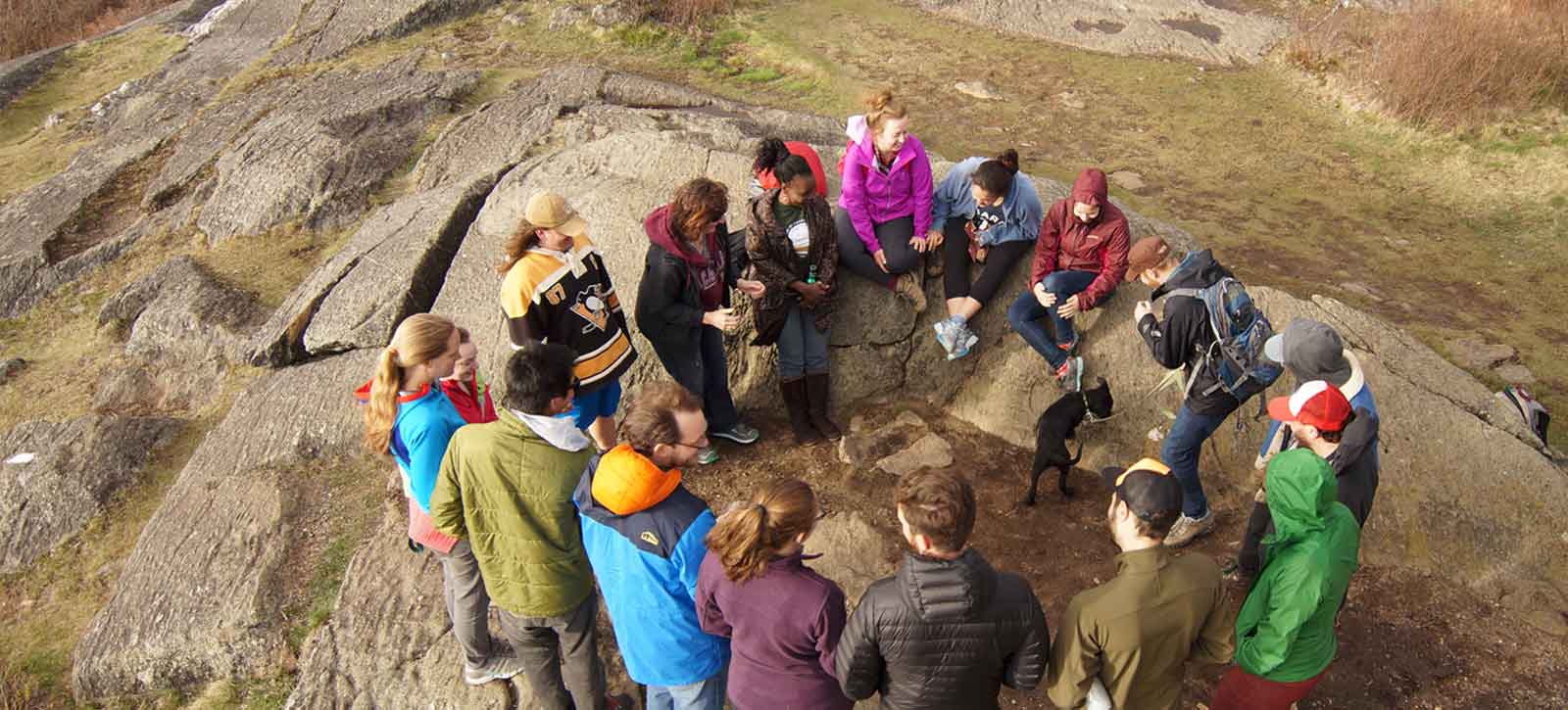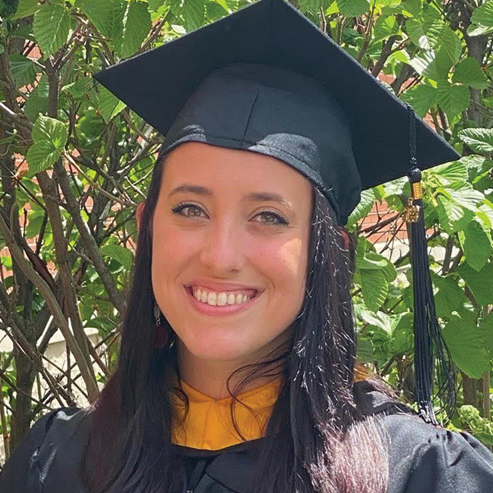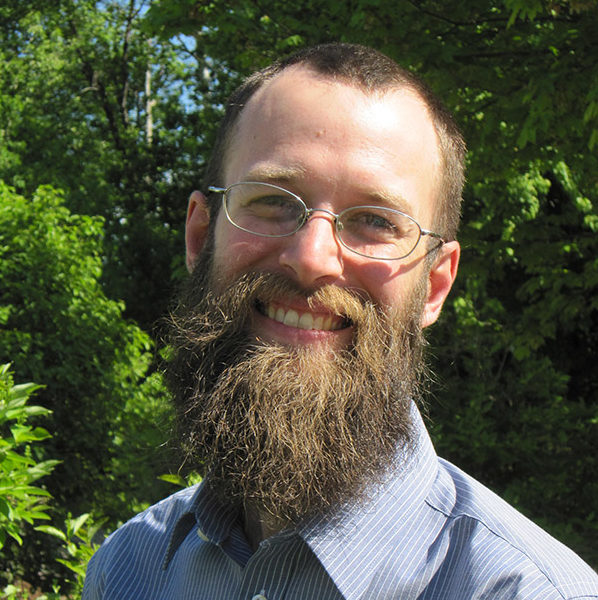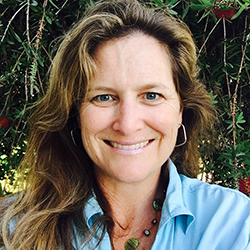Master of Science
MS in Environmental Studies, Environmental Education
Be an Educational Leader and Change Agent.
Learning the skills of powerful educational approaches equips you as a leader and change agent in nature centers and museums, classrooms and higher education, residential facilities, corporations, the media, municipalities, zoos, aquariums, farms, community organizations, and botanical gardens. Educating for sustainability, raising awareness about climate change, reconnecting children and adults to nature and their community, translating science into conservation education, employing conservation psychology techniques, and making sense of the human footprint on the planet are all aspects of Environmental Education.
Antioch’s New England campus offers this degree, available online and in person.


What impacted me most from the Environmental Studies program at Antioch was the heavy emphasis on justice, equity, and inclusion in programming. I have valued the focus on honoring Indigenous knowledge systems and becoming aware of the experiences of marginalized groups in the outdoors.
Victoria Threadgill ’22
Try Us Out
Wondering if Antioch ES MS is right for you? Prospective students can earn up to three credits in a semester at a highly reduced rate. These credits are transferable into the ESMS degree.
Program Overview
Grounded in EE theory and practice, graduate students acquire an interdisciplinary understanding of the social, political, and economic aspects of human systems and how they impact ecological systems. Antioch graduate students learn natural sciences, social sciences, and humanities. Principles of sustainability, justice, and cultural competency are interwoven into our EE approach.
Being an environmental educator means understanding how people learn and what inspires people to change. This specialization balances knowledge about the learning process with a solid foundation in environmental sciences and the acquisition of effective teaching methodologies and educational designs. Students learn to translate the complex web of earth systems science, sustainability, environmental issues, and environmental change for the public. Courses and internships highlight aspects of EE in urban and rural contexts while catering to the individual interests of students. Through innovative coursework, professional internships, and graduate capstones, students acquire the skills and confidence to be leaders in the field.
EE students gain hands-on experience in stewardship practices, positive youth, and community development, program design and evaluation, conservation psychology, and understanding ‘place’ as socio-ecological systems and dynamic classrooms for all ages.Our MS and PhD students, alumni, and EE faculty put the principles and values of this program into professional practice. AUNE is an active partner on the ee360 initiative, “From Inspiration to Impact,” supported by the North American Association for Environmental Education and the U.S. EPA, focused on supporting a diverse cadre of environmental education leaders that are better prepared to increase environmental literacy for everyone, everywhere. Learn more about the AUNE ee360 team and the ee360 initiative. Additionally, students and faculty engage locally through such projects as the Conservation Psychology Institute, the Institute for International Conservation, Community Garden Connections, and the Monadnock Ecological Research & Education Project, to name a few.
Degree Requirements
Master of Science in Environmental Studies, Environmental Education
The Master of Science in Environmental Studies, Environmental is a 36-credit program that can be completed in as little as three semesters and, most typically, in five semesters.
Students in all concentrations select three (9 credits) out of the following four core courses. These courses provide a multidisciplinary foundation for understanding and addressing contemporary environmental issues.
- Applied Ecological Principles (online) or Community Ecology (on campus)
- Leadership for Change
- Earth Systems and Climate Change
- Political Economy and Sustainability
Concentration courses provide the conceptual and theoretical foundations in your program (6 required credits, 2 specific courses) and (15 elective credits;) provide an opportunity to develop a customized skill set that is relevant to your experience and career goals. Additional credits required include a three (3) credit professional internship and a 3-credit Capstone.
Learning Opportunities
If you are not ready to begin a Master’s Program but are ready to start learning, we have several options available. If you then decide to enter a Master’s Program, you will be able to use these credits or certifications in your degree program.
Certificates
Centers and Resources
Featured skills and elective courses
Indigenous Knowledge is the traditional knowledge of Indigenous peoples, a coherent knowledge system that, through cultural traditions and practices, fully integrates the arts and sciences with practical knowledge of conservation, agriculture, medicine, education, and other components of daily life. Indigenous peoples across the globe have a special relationship to their local environments and homelands. In this course we examine how Indigenous ways of being and relating to natural environments can help us understand and work towards environmental sustainability. Our focus is North America with limited global examples. The course is designed for students who are interested in learning about theories of knowledge and practice and applying an interdisciplinary lens to environmental sustainability. Through course materials, lectures, discussions, and guest speakers, we will examine the historical, cultural, and philosophical origins of Indigenous knowledge systems (IKS); the rights of Indigenous peoples to their knowledge and heritage; Indigenous peoples’ relationships to land; Indigenous environmental justice; Indigenous resilience, resurgence and revitalization. We will also briefly discuss Indigenous research and decolonizing methodologies.
The denial of scientific evidence represents an increasingly serious problem. False information and conspiracy theories about climate change have confused the public and stalled support for mitigation policies, obfuscated peoples’ recognition of the biodiversity crisis and contributed to the success of far-right populist campaigns like Brexit. But why do people believe in conspiracy theories and/or anchor to misinformed beliefs even in the face of mounting scientific evidence to the contrary? What makes a person spread information that may have little basis in scientific fact or reason? This course examines the social-psychological factors that make people vulnerable to misinformation and conspiracy theories. The course integrates psychological, political, and communications research to interrogate the causes, consequences, and tenacity of environmental misinformation and conspiracy theories (e.g., chemtrails, climate change, extinction denialism, renewable energies, etc.) and the strategies we can employ to combat it. We will examine how individuals’ susceptibility to information has been exploited, in part, by the media, political elites, and flawed information environments. Furthermore, we will assess the history and role of false information and misleading narratives in supporting the maintenance of structural inequality and power. The goal of this course is not to teach you what to think. Rather, the goal of this course is to teach you how to think about environmental/scientific information and the way it is (mis)represented.
Climate change represents a nexus of environmental and social injustice with deep roots and deeper implications for the future. Unpacking the injustice of climate change requires us to examine what/whose futures have been curtailed. Likewise, working towards climate justice requires us to be able to envision liberatory environmental futures. In this course students will engage with a wide range of environmental futures through narrative, theory, and practice. Apocalyptic and dystopic futures abound throughout the climate discourse but too often obscure more about environmental (in)justice than they reveal, reinforcing the status quo rather than providing us with tools for transforming it. The goal of this course is for students to develop their skills for discerning how climate and other environmental narratives employ environmental values towards just and unjust futures and much in between. With these skills students will undertake a research project—with both critical and creative components—that delves into the environmental narratives and futures at play in the contexts/communities central to their work and/or homes.
Additional Information
You will complete a 3-credit capstone in the form of a master’s project, thesis, collaborative service initiative, or a 2nd professional internship.
Capstone Project (choose one of the capstone options below):
Master’s Project: Typically a descriptive, applied independent research project. Students can address a sustainability challenge in their home community or international area of interest by identifying and developing a solution. Applied GIS projects also can serve as capstones. Recent MS projects include: Proposal for Angola’s Energy Transition: Assessing Conditions and Governance Dynamics; and Analysis of River Corridor Erosion and Soil Loss in the Town of Bernardston, Massachusetts.
Master’s Thesis: Typically an independent empirical research project. Recent MS Theses include: How Is Energy Justice Built Into Community Choice Aggregation? A Comparative Case Study of the Lowell Community Choice Power Supply Program and Cape Light Compact, Massachusetts; The effect of salt marsh restoration on shellfish populations in the Gulf of Maine.
Collaborative Service Initiative: The Collaborative Service Initiative (CSI) is designed to provide an opportunity for outside organizations to work with a team of 2-4 ESMS graduate students who apply their knowledge and skills to an external project that needs to be solved in the community. Projects include developing a place-based education program for a local school system, conducting applied ecological and social research, exhibit and curriculum design, energy and materials management, program/organization evaluation, curriculum and program evaluation, and other consultation projects.
Culminating Professional Internship: After consultation with their Academic Advisor, students may choose to complete a second internship in order to gain more professional experience in their field. Students who choose a second internship should consider how this second professional internship will serve as a launch pad for their post-graduate next step. As a capstone, the experience should be robust, offer significant networking opportunities, and enhance their skill set in new and challenging ways.
Combine your MS in Environmental Studies with Peace Corps service. Through the International Service Program, you can earn credit for your service, apply what you are learning to create positive change across the world and save thousands of dollars on your degree.
You should expect to spend approximately nine hours per week on each 3-credit course and 20-35 hours a week when your practicum and professional internships begin. We encourage you to plan your life carefully to accommodate the increased investment of time and energy in your professional education.
Yes, you can complete this degree fully online. These courses are synchronous and, in some cases, asynchronous. Virtual synchronous course class sessions are offered one evening during the week (Monday-Thursday evenings, ET) and on weekends. You can also choose to take courses with us in person, including field-based courses and campus-based intensives.
This coursework for this program can be completed in 5 semesters. Thesis or project work variable in duration, depending on the topic. Classes are held on Thursdays and Fridays or Fridays and weekends. Online courses and courses offered in other University programs are also available.
Graduates of AUNE MS in Environmental Education degree have gone on to serve as professional educational and community engagement leaders across the globe. Our graduates work for environmental justice, reinvigorate environmental and science education in cities, guide communities in planning for climate change and promote sustainable, just, inclusive practices in EE organizations, schools, informal educational centers and businesses. Among other career paths, our graduates serve as program directors, educational directors at zoos, aquariums and museums, curriculum designers and coordinators for state and federal agencies, and community engagement specialists for land trusts. Here are some examples of the current positions our alumni hold and use the map below to see where in the world our alumni are working to create positive and just change.
Faculty Spotlight

Jason Rhoades, PhD
PhD Program Director, Core Faculty

Dawn Murray, PhD
Core Faculty

Christa Daniels, PhD
Director

Rachel Thiet, PhD
Core Faculty
Admissions / Cost / Aid
Admission
How to Apply
- Complete the online admissions application, including:
- Essay questions, admissions and program-specific
- Resume/curriculum vitae (CV)
- Non-refundable $50 application fee
- Submit official transcripts from all colleges or universities where you earned a degree or certificate.
- email transcripts to [email protected], or
- mail to: Office of Admissions Antioch University New England 40 Avon Street Keene, NH 03431-3516
- Two letters of recommendation are required, from people who are in a position to evaluate your professional or academic work. The person making the recommendation may not be related to you.
- There are additional requirements for International applicants.
- Interview with a faculty member of the department to which you seek entry if selected. This can be in person, by phone, or via Skype.
Official transcripts should be emailed to [email protected] or mailed to: Office of Admissions Antioch University New England 40 Avon Street Keene, New Hampshire 03431-3516 All application materials submitted become part of an applicant’s file and cannot be returned.
Application Deadlines
Application Deadlines
Antioch University processes applications for most programs on a rolling basis, so we encourage you to apply as early as possible. All application materials should be received in Admissions by the dates listed below. If you have any questions, please get in touch with the Admissions Department.
| Program | Term | Deadline |
|---|---|---|
| MS Environmental Studies (All Concentrations) | Fall | July 15 |
| Spring | December 1 |
Tuition & Financial Aid
A college education is an investment in your future. Let us help you understand the costs and explore the resources available to help make your college education even more affordable. The majority of AUNE students finance their education through some form of financial aid. You may not be sure which federal, state, public, and private aid packages – such as loans, scholarships, and grants—are right for you. Our staff is here to help you so you can focus on what’s most important: beginning your academic program at AUNE.

Start your Antioch Journey
Take your next step – talk to our admissions team to find the right program for you.

